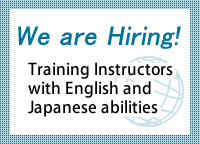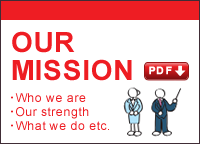![]()
Contact: Mail:[email protected]
TOP > Training Index > Training of Customer Satisfaction and Reception
Training of Customer Satisfaction and Reception

13/10/09 Update
| Track record | Line up | Our Coach | Contact |
 Aims and features
Aims and features
Japanese CS based on the spirit of “omotenashi (hospitality)
There is the special way of thinking of customer satisfaction called “omotenashi (the spirit of hospitality)” in Japan. And because of it, Japanese CS has a top-class quality in the world. What is “omotenashi” all about? It is the spirit of hospitality to please the guests and provide comfort. To be thoughtful of the opponent to please him just as he desires has long been developed as the essence of service industry in Japan. A shop assistant greets with “Irasshai-mase” (“Welcome”) when a guest comes in. He precisely understands the guest’s needs to propose a product or a service. Then he bows deeply to the guest with appreciation for purchasing a product or a service and for visiting. Even now you can see such sequence of typical “omotenashi” (hospitality) at some Japanese traditional hotels and venerable department stores. Wherever they provide services such as ordinary restaurants, shops, banks, Japanese treat guests with politeness and respect because they have the spirit of “omotenashi” (hospitality) deep within themselves.
Business is to provide products and services that satisfy the other party. So we recommend that all the foreign affiliates of any type of business should learn the high quality Japanese Customer Satisfaction based on “the omotenashi spirit” to grasp a part of Japanese ways of business. We suspect you often feel irritated to find the Customer Satisfaction of the home country ineffective to produce any satisfactory outcome in Japan.
Practical CS・Reception training
This training program focuses on the way of reception accepted in the Japanese society, the “omotenashi-based” Customer Satisfaction. You will learn what kind of reception is expected by Japanese people and to what aspects you are required to pay attention in terms of Customer Satisfaction in Japan through lectures and role play.
<Process> Introduction (consciousness-raising) ・What is Customer Satisfaction all about? ・What is “omotenashi”, the Japanese CS? ・Basic etiquettes required for “omotenashi” Hearing and speaking manners required to receive a guest Telephone handling Points for CS improvement of all organization Design a CS improvement plan.
 Track Record
Track Record
The reason why our training is popular
We deliver around 200 trainings of this type annually. The topics of the training can be individual skill or a combination of skills such as CS and reception, complaint handling, CS leadership, etc. We can design and provide training programs for employees of any business field and position to meet the demands of our customers.
Total participants
13,723(※Period covered:2012/4/1~2013/3/31)
Evaluation
Understood
Comments from participants
- Lecturer talked in a nice tone that was comfortable and intelligible for participants, and it was easy to understand. I truly felt that the lecturer is undoubtedly a professional. My workplace has much correspondence with parents, although there are not many opportunities to give service as a receptionist, I would like to communicate with them starting with greeting and utilize what I have learnt today.
- Although I have taken trainings on the same topic for many times already, I was drawn into the lecturer's conversational magic. It is the most convincing training that I have ever attended. I want to make use of it right from today. I think that this skill can be applied to my family too.
- Since I always serve the customers behind a counter, I am used to giving polite correspondence. I was so surprised and thought “Is there really such a way of speaking?” when I heard a more polite way to make responses. I really learnt a lot.
Our Coach
Our lecturers are active in the front line of customer services. They are proficient in telling the knowledge and know-how based on their success and failure experiences in customer services, handling complaints and taking phone calls. As we also have many lecturers who have rich experience in management and giving guidance, we are confident in spreading CS consciousness and encouraging organizational reform.
 Sample training program
Sample training program
| Sample Program | ||
|
LectureExercise | |
|
Lecture | |
|
Lecture | |
|
Lecture Exercise |
|
|
Lecture Exercise |
|
|
Lecture Exercise |
|
|
Exercise | |
この研修カリキュラムはあくまで一例です。お客さまの課題・お悩みに応じて柔軟にカスタマイズ可能です。また、研修効果を高め定着化を促進する「研修呼び覚 まシステム」や研修担当者様の負担を減らし効率向上を支援する「研修管理サービス」もございます。お気軽にご相談下さい。
Contact us
TEL:+813-5577-2273(Tokyo)
 Information
Information- About Us
- Our Mission
- Our Services & Programs
- Milestones
 Our Services & Programs
Our Services & Programs- On-site training & Open Seminars for working people
- Consulting services
- System development and delivery
 Features of Insource training
Features of Insource training- Concepts of Insource training
- Features of Insource training
- Preparation before training
- Evaluating service for the training effects
- Customers' reviews
- Features of Insource's instructors
 Network of Insource
Network of Insource- Tokyo Headquarters
- Hokkaido Branch
- Tohoku Branch
- Kanto Branch
- Osaka Branch
- Nagoya Branch
- Kyushu Branch



